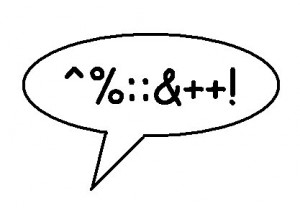 The language we use, both casually and
deliberately, has proven to have a deeper significance when it comes to the
emotional health of ourselves and those around us.
The language we use, both casually and
deliberately, has proven to have a deeper significance when it comes to the
emotional health of ourselves and those around us.
Unless you are living with a disability that dictates
otherwise, we – as the human race – choose our words. Sometimes we choose them
too quickly, and we haven’t thought about the broader impact they may carry.
Sometimes we choose words specifically as a tool to hit a direct emotional
target. Regardless of the intention (or lack thereof), at the most
microscopic level, our brains and hearts have decided to say the things we do.
Casual use of any discriminatory language, even if not
directly being used to dominate or demean another person, can still suggest
that the behaviour of using the language is permissible.
This week Jezebel
released a fantastic article and video from Wisconsin
news anchor Jennifer Livingston,
responding to a viewer email which stated:
“It's unusual that I
see your morning show, but I did so for a very short time today. I was
surprised indeed to witness that your physical condition hasn't improved for
many years. Surely you don't consider yourself a suitable example for this
community's young people, girls in particular. Obesity is one of the worst
choices a person can make and one of the most dangerous habits to maintain. I
leave you this note hoping that you'll reconsider your responsibility as a
local public personality to present and promote a healthy lifestyle.”
Here is Ms. Livingston’s brilliant response:
In the video Ms. Livingston states:
“Now I am a grown
woman, and luckily for me, I have a very thick skin — literally, as that email
pointed out, and otherwise. That man's words mean nothing to me. But what
really angers me about this is there are children who don't know better… The
internet has become a weapon. Our schools have become a battleground. And this
behaviour is learned. It is passed
down from people like the man who wrote me that email. If you are at home, and
you are talking about the fat newslady, guess what? Your children are probably
going to go to school and call someone fat. We need to teach our kids how to be
kind, not critical, and we need to do that by example.”
Children have to decipher what’s appropriate or not by
navigating the influences of their parents/family, peers, educators, the media
and society at large. That’s no easy task, for an extremely impressionable
mind. Are you being mindful of the permissions you are subtly granting the
children around you?
October marks National Bullying Prevention Month. There are
a multitude of organizations, such as GLSEN, GLAAD, The Trevor Project, the Born This Way Foundation, who are spending millions of dollars to actively dismantle the
bullying culture.
Bullies can be easily identified: they are those that choose
language specifically to harm. However, what about those who casually use
discriminatory language with no real hurtful intentions?
I was left a bit dismayed when reading a recent article
released from GOOD magazine about the meaning and variety of uses for the word
“gay”. When I first came across the article, my initial thought was that I was
going to find a piece dedicated to derailing the casual use of the phrase
“that’s so gay.”
To my unwanted surprise, the writer suggested the issues
that arise from using the term “gay” in a negative connotation, would dissipate
should we as a society accept the next shift in language when it comes to the
definition of the word. That the casual use of the phrase “that’s so gay” is really
just to point out that something is of off-kilter in a negative way, having
nothing to do with sexual orientation. The writer cautions that perhaps, just
perhaps, gay people are being a touch oversensitive.
It always amazes me when people question “political
correctness”. What many deem as “political correctness”, I simply view as very
basic respect.
I have a rather simple theory: if I know that there is
someone who validly would rather I not use certain terminology as it depicts
their demographic in an inferior light, regardless of my intention, I’m not
going to use it. Not just “do my best” to remember; I’m going to actively
remove the terminology from my lexicon.
De-contextualization is complicated. If this is your goal in
using derogatory terminology than what else are you doing to promote your
cause? Are you creating petitions? Are you starting a real social movement?
Just tossing in the phrase “that’s so gay” in casual conversation is nothing
short of lazy.
It’s your right to feel, think and speak any way you choose.
But allowing yourself to be verbally harmful intentionally is criminal.
Allowing yourself to be unintentionally harmful is truculent.
“The
limits of my language means the limits of my world.“ – Ludwig Wittegenstein
 FYI: NoHomophobes.com has launched a running ticker of twitter
updates that use the following terms. Between July 5th, 2012 and October 2nd, 2012:
FYI: NoHomophobes.com has launched a running ticker of twitter
updates that use the following terms. Between July 5th, 2012 and October 2nd, 2012: - The word “Faggot” had been tweeted 2,690,629 times.
- The phrase “So Gay” had been tweeted 960,073 times.
- The phrase “No homo” had been tweeted 902,891 times.
- The term “Dyke” had been tweeted 371,165.

No comments:
Post a Comment